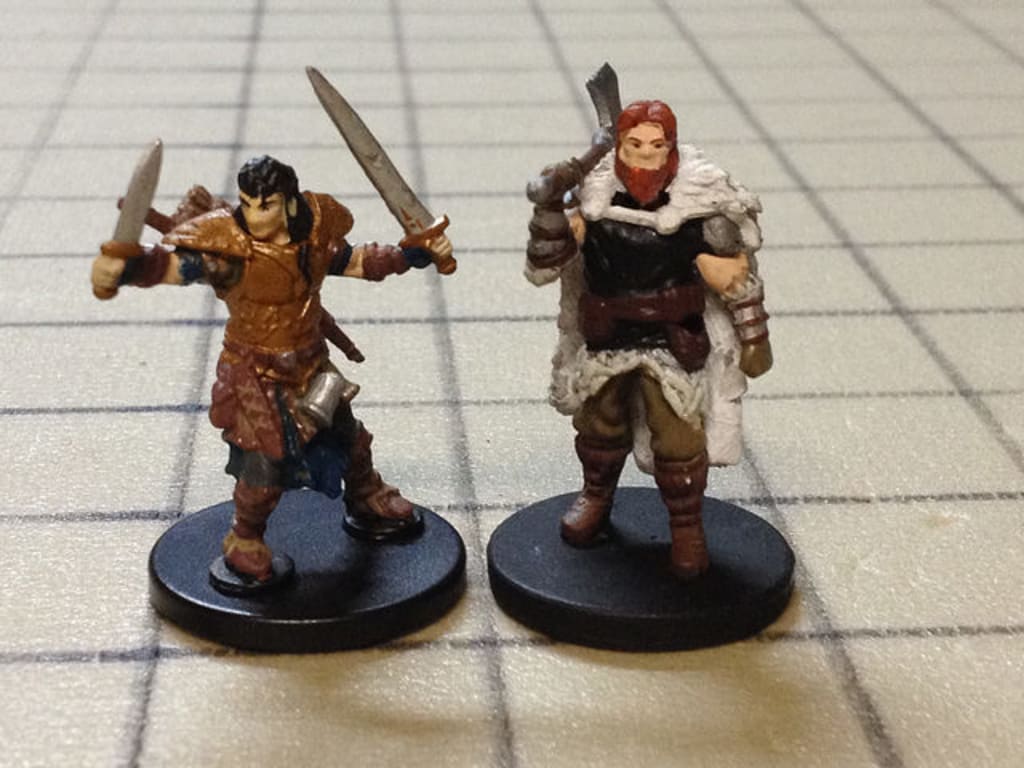Getting Your Character a Life
Some Tips on How to Develop a Creative and Compelling Backstory for You D&D Character

One of my favorite things about D&D is character creation. It is fun, and often addicting, to come up with different combinations of race and class, rolling stats, and equipping characters. For those who enjoy lore and character-driven role play, establishing your character's place in the many D&D settings is the most thrilling. Finding ways to weave your character into the fabric of Faerûn, Eberron, or a homebrew campaign setting is challenging, and often requires puzzle solving and logic skills to do properly.
Know your setting.
When I created my first D&D character, Orrick Fireforge, getting to the meat of who he was in relation to Faerûn was a daunting task. I was not familiar with much of the lore, so I had to pretty much do a ton of studying of wikis and forum posts to get a feel for the world. Once I found a few interesting tidbits of lore and got to know the setting better, I went about crafting an interesting backstory.
The Player's Handbook gives you many ways to establish a backstory for your character. Using backgrounds helps ground the character in the world in a believable sense. These can be jumping off points for your creativity.
Reflect on yourself.
A great way to start coming up with a backstory for me was to choose a few aspects of my own personality that I would like reflected in Orrick. Orrick is a dwarf, and dwarves canonically tend to be very loyal to their clan and take pride in their craft. They don't seem to mind following a track that was preset for them. This is definitely not in my personality. So I decided that Orrick was going to be one who found the system to be too constricting and hindering of creativity.
In his backstory, Orrick's father is a blacksmith who expects his son to follow in his footsteps. I decided that Orrick would be an apprentice to his father, but ultimately not enjoy smithing. However, I didn't want to create a "daddy issues" character who didn't get along with his father. So I decided that he instead would favor his mother's profession: she was a scribe. This retained a sense of familial cohesion and lessened the tension between Orrick and his parents. His father was understanding enough and accepted Orrick's choice. This established my first backstory hook. So with the idea that Orrick wanted to be a scribe, where would he go from there?
Another aspect of my personality I wanted to instill in Orrick was a love of reading. This led me to have Orrick serve as a high librarian at the Master's Library in The Vast, just outside of Impiltur. More specifically, he served as a guard of the Reading Room. This also established his chosen deity, Deneir, the god of literature, scribes, and knowledge.
If you want a real challenge, imbue your character with personality aspects that you don't have or wish you had, and play them up in the story. If you're anxious in social situations, play your character as a social butterfly or even garishly outgoing. If you don't like violence all that much in real life, make your character bloodthirsty. You can learn a whole lot about yourself while playing your character this way.
Home is where the story is.
I made Impiltur his hometown, and in turn I decided that when the time came for Orrick to serve the local militia, the Warswords of Implitur, I figured a scribe in the military would make a great intelligence officer. This established that his chosen profession would be useful in the context of his environment and it would give me the chance to weave his class into his backstory. Orrick is a fighter, so I used his military training and experience as a soldier to explain why a guy who likes to read and write seems so good at fighting. This is key to making your class choices seem logical. Natural progression makes for a believable backstory.
Establish flaws.
With this as a base, I had enough information about Orrick's past to help establish his present state. The next step was to develop a few flaws. No character is ever perfect, and flawed characters make for more drama. From his extensive time as a military intelligence officer and his tenure at the Master's Library, I made him compulsively protective of information, especially history. He finds it insulting when people embellish or hyperbolize stories that have well established facts available to anyone. This, in turn, led me to have him not like bards very much, as their job was to embellish history for the sake of song.
Because Orrick is essentially a history nerd, I figured it'd only be natural that he was horrible in social situations and often patronized those he found to be lacking in the smarts department. Giving him this kind of flaw allows for character development later on in the campaign. Maybe after adventuring with people, he finally learns to not be so hard on those who may or may not be as smart as he is. But he'd probably still hate bards.
Quirk it up.
Flaws allow for character development, but quirks give your character something unique for others to pick up on, either endearing your character to them or giving them a reason to not like them. I tend to pick quirks that go against stereotype, as those tend to surprise other players and usurp their first judgment of your character. Orrick is a dwarf, and dwarves are known for their cast iron stomachs and alcohol tolerance. I decided that Orrick would be a teetotaler and only drink water. His reasoning is that alcohol clouds the mind and makes people do dumb things. Being dumb is not something Orrick is into.
Another quirk I decided Orrick would have is his view of combat. He's seen his share of battles, but all he really would like to do is read and write. Anything that got in the way of him doing those things was more of a nuisance than anything else. His axe is quick to strike, efficient, and dangerous, but he just wants the fighting to end so he can get back to reading. This often leads him to be reluctant to fight unless it is absolutely necessary.
I feel like Orrick is as fleshed out as he could be for the beginning of a campaign. There are more specific details I could establish, like certain events occurring while he was at the Library or in the military, that would give a DM some story points to build a part of the campaign on. I would do this at the request of my group's DM and help him weave those events into his ideas. Giving your DM ways to incorporate your character's history into the story gives you the chance to be the star of part of the campaign and help improve your group's cohesion by delving into your personal history.
Orrick Fireforge's story has yet to be finished, but he has a solid background from which he can start his adventuring career. For your own character, remember that flaws, quirks, and a firm foundation in the campaign setting helps you develop a well-rounded, believable character that will be fun to play. Putting parts of yourself into the character or playing against your own personality can keep you engaged and willing to explore facets of your own character and personality as well as the one in the game. Creating a well-established backstory will give you, your group, and your DM a basis for hopefully a long, interesting, and fun campaign.
About the Creator
Sean Fraser
Aimless polymath who knows a little bit about a lot of things. D&D/Sports nerd hybrid. Fan of the NFL's Buffalo Bills, League One's AFC Wimbledon, Critical Role, Dice, Camera, Action!, and Acquisitions, Inc. C Team. And chicken wings.






Comments
There are no comments for this story
Be the first to respond and start the conversation.